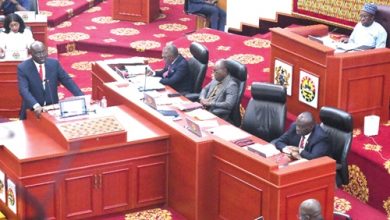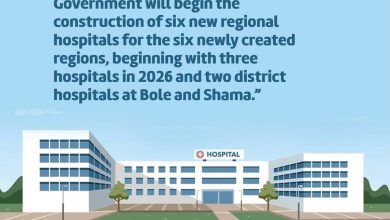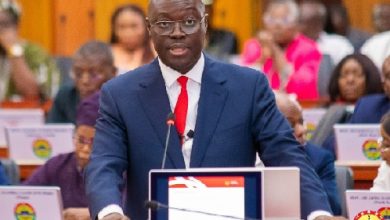President John Dramani Mahama yesterday commissioned phases one and two of the Tema Port expansion project, describing it as the realisation of a long-held national dream and a strategic asset that will position Ghana as the gateway to West Africa.
The President said that the modernised port, also referred to as a “teleport,” was a tangible symbol of national aspiration and international confidence poised to transform the nation’s economy and regional trade.
“The teleport expansion is one of the most ambitious projects in Africa’s maritime sector. This project is a realisation of the dream we have nurtured for years, and today it has become a tangible reality.”
Present at the ceremony were the Minister of Transport, Bukari Nikpe; the Director-General of the Ghana Ports and Harbours Authority (GPHA), Brigadier-General Paul Seidu Tanye-Kulono; the National Chairman of the National Democratic Congress (NDC) and Board Chair of the GPHA, Johnson Asiedu Nketiah, and the Aide to the President, Joyce Bawa Mogtari.
Also present were shareholders of the project, including the CEO of Meridian Port Services (MPS), Mohamed Samara.
Significance
President Mahama said the facility would significantly boost the country’s logistics capacity, drastically reduce turnaround times for ships and cargo, and increase efficiency.
“This modernisation gives us a competitive edge. It is a strategic asset, attracting investment, creating jobs, and facilitating growth across sectors.
“From engineers and technicians, through to logistics professionals, artisans and service providers, thousands of citizens have been gainfully employed during the period of its construction and also during its current operations,” he said.
The President further said that the new port was a central player in Africa’s economic transformation, especially with the advent of the African Continental Free Trade Area (AfCFTA).
“With the African Continental Free Trade Area now in effect, Tema Port is strategically positioned as one of the key enablers of intra-African commerce.
“It will move goods seamlessly across borders, connecting producers, traders, and consumers throughout the continent,” he said.
He revealed plans to establish a ferry service linking Ghana to other West African countries, similar to services in Europe, which would allow passengers and vehicles, including trucks, to move freely across the region.
Public-Private Partnership
The President paid tribute to the project partners, including APM Terminals, for their collaboration, which he said “exemplifies the best of public-private partnership.”
“Together, you have built more than just a port; you have built a legacy, a modern, world-class manifestation that will serve not only the land, but the entire continent of Africa for hundreds of years,” he said.
President Mahama said the government remained committed to providing a stable and predictable environment to encourage more forward-looking partnerships.
He charged the port managers and shareholders to continue investing in capacity-building, embrace automation and adopt new technologies to maintain Tema Port’s position as “a benchmark for efficiency, safety, and sustainability among all the ports in Africa.”
About terminal
Mr Samara said that the terminal was a one-of-a-kind engineering marvel in the region, which was opened directly to the Atlantic with a deep-water channel that could accommodate the world’s largest container vessels.
“Other neighbouring ports are tucked behind breakwaters.
We have a deep-water channel that can take a ship with a draft of 16 metres at any moment—low tide doesn’t matter,” he said.
Mr Samara further said that the four berths, stretching 1.4 kilometres and equipped with some of the largest ship-to-shore cranes in the world, were built with materials designed to last for 100 years, ensuring a lasting legacy for future generations.
There was an increase in the port’s capacity from 800,000 TEUs (Twenty-Foot Equivalent Units) to 3.7 million TEUs.
“Within the next few hours, this terminal will clock two million TEUs handled – a milestone no other port on the West Coast has done,” the CEO said.
On operational philosophy, the CEO highlighted that safety and efficiency were inseparable.
He added that the project had created 5,000 professional jobs.




